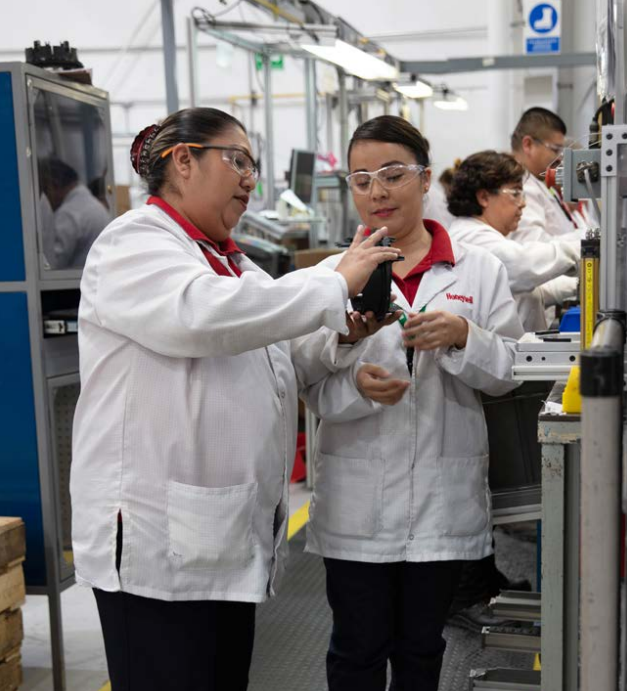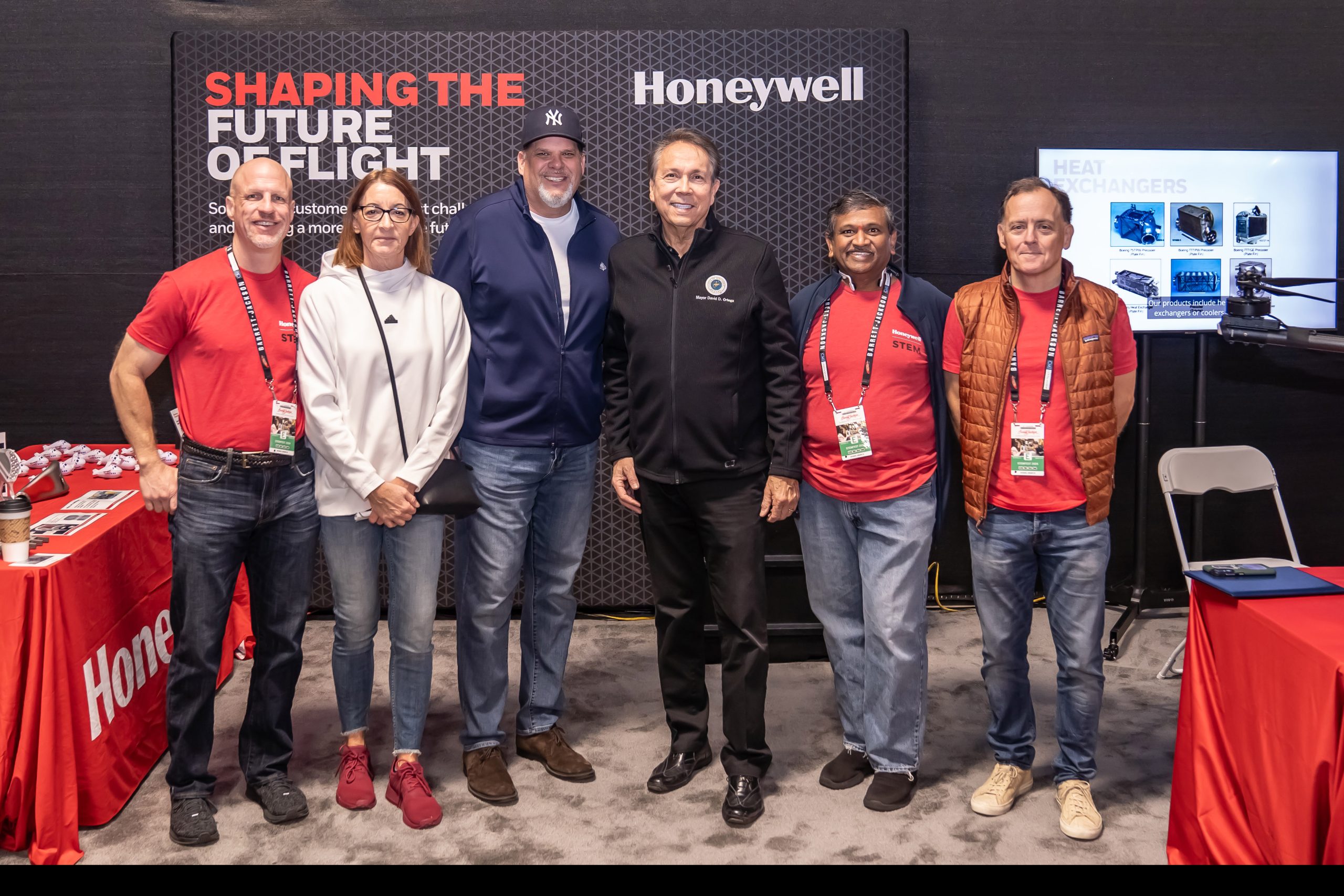This article is part of a series of profiles of CalChamber member companies that are contributing to the state’s economic strength and ability to stay competitive in a global economy. Visit California Works to learn more about this series and read past and future profiles.
 Honeywell is an integrated operating company serving a broad range of industries and geographies around the world. The business is aligned with three powerful megatrends that are shaping modern life — automation, the future of aviation and the energy transition — to drive accelerated innovation that will help solve the world’s toughest sustainability and digitalization challenges.
Honeywell is an integrated operating company serving a broad range of industries and geographies around the world. The business is aligned with three powerful megatrends that are shaping modern life — automation, the future of aviation and the energy transition — to drive accelerated innovation that will help solve the world’s toughest sustainability and digitalization challenges.
Headquartered in the United States, Honeywell operates in 717 locations around the world, 15 of which are in California. Here, more than 1,100 Honeywell scientists, engineers, and futureshapers are working to create a more sustainable tomorrow across industries and around the globe, generating an annual California payroll of more than $200 million.
The company also invests deeply in the talent and expertise of numerous California-based suppliers; currently, Honeywell has more than $700 million in overall purchases and contracts throughout the Golden State.


Innovating for Impact
For nearly 150 years, Honeywell’s inventions have been at the forefront of modern innovation. From creating the world’s first standardized barcode to supporting the first manned mission to space, the company has more than a century of experience in transforming how people live, work, travel and connect. Moreover, it has an ongoing commitment to shaping a brighter future.
Today, Honeywell innovations are creating opportunities for its customers to lead smarter, safer, and more productive lives. The company continues to introduce cutting-edge offerings for a vast number of global markets and industries, with a portfolio of products and solutions that spans the industries and sectors which most directly contribute to making a comprehensive energy transition at-scale. This includes solutions that address energy efficiency, electrification, net-zero enablers, health, safety and security, circularity, and measurement and reporting.
More than 60% of Honeywell’s research and development is dedicated to solving these kinds of challenges, allowing the company to stay on the cutting edge of sustainable innovation to lead the energy transition.
These solutions work together to help reduce CO2 emissions across some of the industries that are most difficult to abate, helping to make significant contributions to environmental sustainability worldwide. Between 2023 and 2030, Honeywell technologies will cumulatively mitigate an estimated 2 billion metric tons of CO2e — representing the potential to address close to 50% of anthropogenic greenhouse gas (GHG) emissions across global sectors of importance. This is 175 times Honeywell’s own projected Scope 1 and 2 GHG emissions over the same period.
As Honeywell looks to the future, it will continue to innovate for impact, both to improve company operations as it progresses toward carbon neutrality in its own operations by 2035, and to continue helping customers solve their most complex challenges.
California Focus
In California, with its long history of aerospace innovation, Honeywell’s work on Sustainable Aviation Fuel (SAF) is a significant example of the company’s commitment to innovating for impact.
The company’s Ecofining Process produces high-quality, renewable jet fuel that performs similar to petroleum fuels. Made from vegetable oils, animal fats and non-food-based, second-generation feedstocks such as camelina, jatropha and algae, SAF made by the Ecofining Process meets or exceeds critical specifications for flight. When used up to a 50% blend, it can be a drop-in replacement, requiring no changes to fleet technology or the fuel storage and delivery infrastructure.
In 2022, Honeywell joined World Energy in announcing a 700% increase in production of Sustainable Aviation Fuel at its Southern California renewable fuels production facility, in the city of Paramount. Under the agreement, the former oil refinery site will produce 100% sustainable fuel which — by 2050 — will displace more than 76 million metric tons of carbon dioxide, the equivalent of 3.8 million carbon-net-zero flights from Los Angeles to New York. It will also significantly reduce the fine particulate emissions in the trucks, trains, and planes powered by World Energy’s fuels.
Meanwhile, in Oakland, Honeywell has partnered with Mighty Buildings — an innovator committed to helping solve the housing and climate crises by transforming the way the world builds homes. Mighty Buildings will use Honeywell Solstice Liquid Blowing Agent (LBA) as a key component in the material it uses to build 3D-printed homes. This low-global warming potential (GWP) technology will replace traditional foam insulation, helping Mighty Buildings reduce emissions and produce strong, energy-efficient building panels.
The impact can be significant. A recent United Nations Environment Programme report found that the construction and building industry is responsible for 37% of global greenhouse gas emissions.Solstice® LBA has the potential to reduce the industry’s environmental impact as its GWP is 99.9% lower than other blowing agents commonly used during construction. With Solstice® LBA, 3D-printed homes can be built with near-zero waste and in a quicker timeframe than conventional construction methods.
A Smarter, Safer, More Sustainable Future
With 60% of the company’s forward-looking research and development (R&D) directed toward solutions that drive sustainable outcomes and a portfolio supporting nearly two-thirds of greenhouse gas-emitting sectors, Honeywell is committed to leading the energy transition and shaping a sustainable tomorrow.
As a proud member of the California Chamber of Commerce, Honeywell shares the CalChamber’s passion for making California the best place to live, work, and do business, and looks forward to continuing to create the technologies that help make the world smarter, safer and more sustainable, right here in California.

